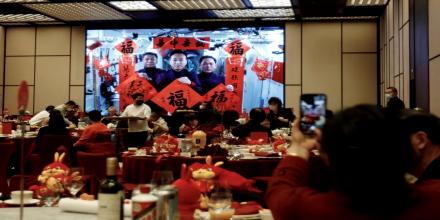China's Tiangong: Expanding Horizons as a Challenger to ISS Dominance
05.10.2023 posted by Admin

China has ambitious plans to expand its space station from three modules to six over the next few years. This move aims to provide astronauts from various countries with an alternative hub for missions in the near-Earth region, as the aging NASA-led International Space Station (ISS) approaches the end of its operational life.
The China Academy of Space Technology (CAST), a branch of China's primary space contractor, announced at the 74th International Astronautical Congress in Baku, Azerbaijan, that the operational lifespan of the Chinese space station would exceed 15 years. This duration surpasses the previously announced 10-year span.
China's independently constructed space station, known as Tiangong or "Celestial Palace" in Chinese, has been fully operational since late 2022. It can accommodate up to three astronauts at an orbital altitude of up to 450 kilometers (280 miles).
After expanding to six modules, Tiangong will have a total mass of 180 metric tons. Despite this expansion, it will still be only 40% of the mass of the ISS, which has the capacity to house a crew of seven astronauts. However, both Tiangong and the ISS are expected to play their roles until around 2030, the same time when China envisions itself becoming a "major space power."
In the past, Chinese state media emphasized that China would not lag behind as the ISS approaches retirement, and they mentioned that several countries expressed interest in sending their astronauts to the Chinese station. However, the European Space Agency (ESA) dealt a setback to China's space diplomacy aspirations this year when it announced it lacked the budgetary and "political" approval to participate in Tiangong. This decision shelved a long-standing plan for European astronauts to visit the station.
The Global Times, a Chinese nationalist tabloid, criticized this move, calling it "short-sighted" and attributing it to the new space race triggered by confrontations within the U.S.-led camp.
Tiangong stands as a symbol of China's growing influence and confidence in space exploration, posing as a challenger to the United States in this arena, especially after being excluded from the ISS due to U.S. legislation prohibiting any direct or indirect collaboration with NASA.
Russia, a longstanding ISS participant, is also pursuing space diplomacy, suggesting that its partners in the BRICS group (Brazil, India, China, and South Africa) might collaborate on constructing a module for its space station. Roscosmos, the Russian space agency, revealed plans to build a six-module space station capable of hosting up to four cosmonauts last year.
The China Academy of Space Technology (CAST), a branch of China's primary space contractor, announced at the 74th International Astronautical Congress in Baku, Azerbaijan, that the operational lifespan of the Chinese space station would exceed 15 years. This duration surpasses the previously announced 10-year span.
China's independently constructed space station, known as Tiangong or "Celestial Palace" in Chinese, has been fully operational since late 2022. It can accommodate up to three astronauts at an orbital altitude of up to 450 kilometers (280 miles).
After expanding to six modules, Tiangong will have a total mass of 180 metric tons. Despite this expansion, it will still be only 40% of the mass of the ISS, which has the capacity to house a crew of seven astronauts. However, both Tiangong and the ISS are expected to play their roles until around 2030, the same time when China envisions itself becoming a "major space power."
In the past, Chinese state media emphasized that China would not lag behind as the ISS approaches retirement, and they mentioned that several countries expressed interest in sending their astronauts to the Chinese station. However, the European Space Agency (ESA) dealt a setback to China's space diplomacy aspirations this year when it announced it lacked the budgetary and "political" approval to participate in Tiangong. This decision shelved a long-standing plan for European astronauts to visit the station.
The Global Times, a Chinese nationalist tabloid, criticized this move, calling it "short-sighted" and attributing it to the new space race triggered by confrontations within the U.S.-led camp.
Tiangong stands as a symbol of China's growing influence and confidence in space exploration, posing as a challenger to the United States in this arena, especially after being excluded from the ISS due to U.S. legislation prohibiting any direct or indirect collaboration with NASA.
Russia, a longstanding ISS participant, is also pursuing space diplomacy, suggesting that its partners in the BRICS group (Brazil, India, China, and South Africa) might collaborate on constructing a module for its space station. Roscosmos, the Russian space agency, revealed plans to build a six-module space station capable of hosting up to four cosmonauts last year.